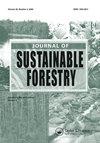Awareness, Knowledge and Perception of Forest Dependent Communities on Climate Change in Malawi: A Case of Mchinji and Phirilongwe Forest Reserves in Malawi
IF 1.8
4区 农林科学
Q3 FORESTRY
引用次数: 2
Abstract
ABSTRACT Projected climate change presents many challenges and opportunities for individuals, households and wider society on how to adapt. Local knowledge is key to help smallholder farmers to cope with climate change and variability to attain sustainable forest management. However, there is limited understanding of what shapes human adaptation to climate change in various sectors at local level including forestry in sub-Saharan Africa. Therefore, this study explored the awareness, knowledge and perception of forest-dependent communities on climate change and variability around Phirilongwe and Mchinji forest reserves in Malawi. Empirical data was collected using household surveys (n = 422), key informant interviews (16), and focus group discussions (8). Results suggest that 60% of respondents in Mchinji were aware of climate change as compared to only 35% in Mangochi. Results record that respondents perceived increased erratic rainfall, high temperatures and strong winds and changes in seasons. The main factors influencing their climate perception includes possession of farming skills (p = .002), Education (P = .04), gender (P = .002) and possession of livestock keeping skills (p = .02). However, the cube root stratification method indicates that their level of knowledge falls in the low-level category. Although negligible proportion of climate skepticisms was exposed, a strong belief in anthropogenic causes of climate change and willingness to adopt environmental friendly intervention measures were revealed. However, the presence of the believers in the cultural and spiritual causes of climate change in the study area presents a challenge to mobilize them toward implementation of climate intervention measures and forest management. We therefore recommend their participation in the climate adaptation intervention designs and multiple use of various strategies and methods that will help to address their livelihoods at the same time improve their climate information and knowledge.马拉维依赖森林的社区对气候变化的认识、知识和感知——以马拉维Mchinji和philongwe森林保护区为例
预估的气候变化给个人、家庭和更广泛的社会带来了许多如何适应的挑战和机遇。当地知识是帮助小农应对气候变化和变异、实现可持续森林管理的关键。然而,对于是什么影响了包括撒哈拉以南非洲林业在内的各个地方部门的人类对气候变化的适应,人们的了解有限。因此,本研究探讨了马拉维Phirilongwe和Mchinji森林保护区周围森林依赖社区对气候变化和变率的认识、知识和感知。通过家庭调查(n = 422)、关键信息者访谈(16)和焦点小组讨论(8)收集经验数据。结果表明,Mchinji 60%的受访者意识到气候变化,而Mangochi只有35%。调查结果显示,受访者认为不稳定的降雨、高温、强风和季节变化增加了。影响其气候感知的主要因素包括是否拥有农业技能(p = .002)、教育程度(p = .04)、性别(p = .002)和是否拥有牲畜饲养技能(p = .02)。然而,立方根分层法表明,他们的知识水平属于低水平范畴。尽管气候怀疑论者的比例可以忽略不计,但人们强烈相信气候变化的人为原因,并愿意采取环境友好的干预措施。然而,研究区域气候变化的文化和精神原因的信徒的存在对动员他们实施气候干预措施和森林管理提出了挑战。因此,我们建议他们参与气候适应干预设计,并多种使用各种战略和方法,这些战略和方法将有助于解决他们的生计问题,同时改善他们的气候信息和知识。
本文章由计算机程序翻译,如有差异,请以英文原文为准。
求助全文
约1分钟内获得全文
求助全文
来源期刊

Journal of Sustainable Forestry
Social Sciences-Geography, Planning and Development
CiteScore
3.90
自引率
12.50%
发文量
42
期刊介绍:
Journal of Sustainable Forestry publishes peer-reviewed, original research on forest science. While the emphasis is on sustainable use of forest products and services, the journal covers a wide range of topics from the underlying biology and ecology of forests to the social, economic and policy aspects of forestry. Short communications and review papers that provide a clear theoretical, conceptual or methodological contribution to the existing literature are also included in the journal.
Common topics covered in the Journal of Sustainable Forestry include:
• Ecology, management, recreation, restoration and silvicultural systems of all forest types, including urban forests
• All aspects of forest biology, including ecophysiology, entomology, pathology, genetics, tree breeding, and biotechnology
• Wood properties, forest biomass, bioenergy, and carbon sequestration
• Simulation modeling, inventory, quantitative methods, and remote sensing
• Environmental pollution, fire and climate change impacts, and adaptation and mitigation in forests
• Forest engineering, economics, human dimensions, natural resource policy, and planning
Journal of Sustainable Forestry provides an international forum for dialogue between research scientists, forest managers, economists and policy and decision makers who share the common vision of the sustainable use of natural resources.
 求助内容:
求助内容: 应助结果提醒方式:
应助结果提醒方式:


